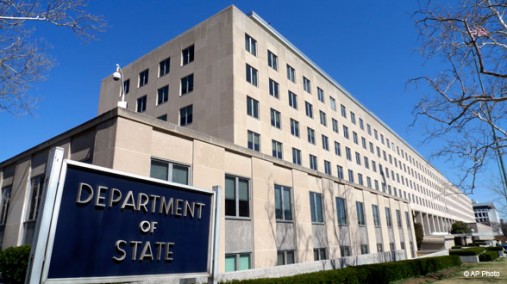Washington voice concern over growing tensions in Nagorno-Karabakh

By Sara Rajabova
The United States has expressed concerns over the increasing tensions between Armenia and Azerbaijan in Nagorno-Karabakh.
Jen Psaki, Spokesperson for the U.S. State Department said at a daily press-briefing on January 5 that the U.S. authorities are worried by reports of ceasefire violations in recent days in Nagorno-Karabakh, according to the U.S. Department of State website.
"We are troubled by reports of ceasefire violations, as well as casualties in recent days. These incidents do not correspond to the Armenian and Azerbaijani presidents’ commitments to reach a peaceful resolution to the Nagorno-Karabakh conflict," Psaki said.
She added that Washington will once again urge the two sides to engage in peace negotiations.
"As an OSCE Minsk Group co-chair country, we do continue to urge both sides at the highest levels to engage in negotiations that could lead to a peace agreement and adopt measures to reduce the likelihood of such events along the line of contact and along the border. That continues to be our focus," Psaki said.
Earlier, James Warlick, the U.S. co-chair of OSCE Minsk Group wrote on Twitter about his expectations in 2015 in terms of settlement of Armenian-Azerbaijani Nagorno-Karabakh conflict.
“2015 should be a year for Nagorno-Karabakh peace and a lasting settlement. Renewed violence is not the answer,” Warlick tweeted.
The Armenian armed forces have recently escalated the tensions on the contact line of Armenian and Azerbaijani troops with frequent ceasefire violations.
They fired at the positions of the Azerbaijani armed forces and frontline settlements by using large-caliber weapons, anti-tank grenade launchers and 60- and 82-millimeter mortars on January 3.
The Azerbaijani Defense Ministry said Armenia aggressively targets Azerbaijani civilians and wants to seek revenge for its unsuccessful operations at the contact line.
Armenia occupied over 20 percent of Azerbaijan's internationally recognized territory, including Nagorno-Karabakh and seven adjacent regions, after laying territorial claims against its South Caucasus neighbor that caused a brutal war in the early 1990s.
As a result of the military aggression of Armenia, over 20,000 Azerbaijanis were killed, 4,866 are reported missing and almost 100,000 were injured, and 50,000 were disabled.
The UN Security Council has passed four resolutions on Armenian withdrawal from the Azerbaijani territory, but they have not been enforced to this day.
Peace talks, mediated by Russia, France and the U.S. through the OSCE Minsk Group, are underway on the basis of a peace outline proposed by the Minsk Group co-chairs and dubbed the Madrid Principles. However, the negotiations have been largely fruitless so far despite the efforts of the co-chair countries over 20 years.
--
Sara Rajabova is AzerNews’ staff journalist, follow her on
Twitter: @SaraRajabova
Follow us on Twitter @AzerNewsAz
Here we are to serve you with news right now. It does not cost much, but worth your attention.
Choose to support open, independent, quality journalism and subscribe on a monthly basis.
By subscribing to our online newspaper, you can have full digital access to all news, analysis, and much more.
You can also follow AzerNEWS on Twitter @AzerNewsAz or Facebook @AzerNewsNewspaper
Thank you!
